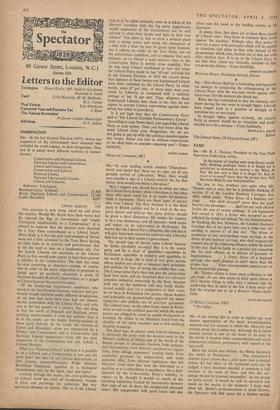Letters to the Editor
Torrington Henry Kerby, MP, Andrew Goodman,
Reginald A. Smith
Taxi! Colin Haycraft, M. M. Melinsky,
R. C. Turner
`Pop' Fiction Lois Mitchison Converted Vans and Purchase Tax I. Hunt
`The Vatican Revolution'
Professor Geddes MacGregor
Soft Soap N.C. Atkins
TORRINGTON SIR,—At the last General Election (1955), twenty-one supporters of the Government were returned who included the word LIBERAL in their designation. They saw fit to adopt seven different varieties of nomen- clature: Conservative and National Liberal. National Liberal and Conservative. Liberal and Conservative.
Conservative and Liberal.
National Liberal.
National Liberal and Unionist. Liberal and Unionist.
And now : Torrington:
Bonham-Carter (Liberal) .. .. 13,408 Royle (National Liberal and Conservative) 13,189 Lamb (Socialist) .. 8,697 Liberal majority 219 One question is now being asked up and down the country. Would Mr. Royle have done worse had he rejected the flag of convenience and fought Torrington unashamedly as a Conservative? It is absurd to suppose that the electors were deceived by a Tory Esau camouflaged as a Liberal Jacob. More likely is it that the men (and women) of Devon were not a little alienated by the Tory Party having so little faith in its policies and performance that it felt the need to lean on a hyphenated ally. For the hybrid Liberals are anathema to the Liberal Party as they would now appear to have been proved a liability to the Conservative. The time has come to stop conniving at chicanery—unless, of course, one or other of the party oligarchies is prepared to lavish upon an apathetic electorate a posse of National-Socialist-Radical-Conservatives or a gaggle of Liberal-Labour-National-Unionists.
Of the twenty-one hyphenated candidates who stood in the last General Election, fourteen had pre- viously fought elections under different designations. At no time bad more than four had any demon- strable connection with the Liberal Party and only one in the last quarter of a century. The odd thing is that the north of England and Scotland, where political dumb-crambo is even less popular than it is in the. south, are the happy hunting-ground of these party hybrids. In the south, the electors of Luton and Devonport alone are represented by a Liberal and Conservative and a Conservative and National Liberal respectively—both 100 per cent. :supporters of the Government and one, indeed, a Cabinet Minister.
What is a 'National Liberal' and how is it possible to be a Liberal and a Conservative at one and the same time? Are they by any chance descendants of that famous nineteenth-century Prime Minister Benjilliam Gladsraeli, equalled as a biological phenomenon only, by. the tigon, tiger and mule?
Looking through the names, the cross-pollination of Liberal stock has paid off handsomely enough if place and patronage are yardsticks. But two questions demand an answer. One is, if the Liberal
vote is to be taken seriously, even as a token of the electors' boredom with the big party juggernauts, would supporters of the Government not be well advised to shed their cloaks and fight in their true colours? The other is, that to cross a tobacco plant with a spring onion and watch the emergence of a leek with a filter tip may be good rustic humour, but it reflects no credit on the Tory Party, nor on the unfortunate candidate, and to suppose that such alchemy on so liberal a scale attracts votes to the Conservative Party is merely crass stupidity. Nor do they keep Liberal candidates at bay—for when the Liberal Party made its last 'all-out' national bid in the General Election of 1950 the record shows that eighteen of these twenty-one hyphenated Liberal seats were contested by the Liberal Party. In other words, some 87 per cent, of these seats were con- tested by Liberals, as compared with a national average of but 76 per cent. Thus, whatever these hyphenated Liberals may claim to do, they do not appear to prevent Liberal intervention against them- selves, but rather to provoke it.
Is it not high time that the Conservative Party said to 'The Liberal Unionist Parliamentary Group': `According to your News-sheet, you regard the Liberal Party as your enemy. Then you had better drop the word Liberal from your designation, for we are not going to put up with this political mumbo-jumbo any longer. Either you join us without reservations or we shall have to consider opposing you.'—Yours faithfully,






























 Previous page
Previous page